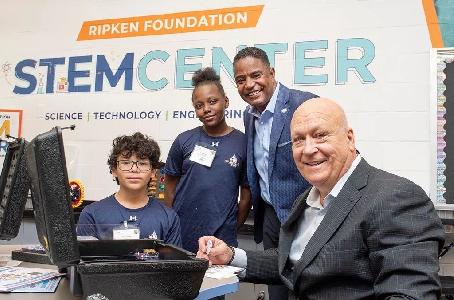When it comes to getting folks on a path to a career in industries like technology, Maryland’s state government should provide a pathway that includes skills training and funding, as well as bolster childcare and transportation to help ease connections to those opportunities.
That’s what Maryland gubernatorial candidate and tech entrepreneur Mike Rosenbaum is proposing in what he said will be the first in a series of economic plans.
The Baltimore Democrat said in a recent interview with Technical.ly that he wants to use those existing state resources to improve the current unemployment rate, and address bias in the system of hiring along race, class and gender lines. He wants to create a training program, called Maryland 2030, to spur folks who are unemployed or working lower-wage jobs to get on pathways to industries that offer a $65,000-a-year jobs and have many open roles, but require skills training. These industries include tech, healthcare, manufacturing and building trades.
The goal is to help 250,000 people move into careers within four years, including 100,00 African Americans, per the proposal.
This can be accomplished by bolstering training and apprenticeship programs through the education system, private employers, unions and the state’s existing network of workforce development programs, Rosenbaum said. There’s also a role for state government for employment while learning, as apprentices could tackle work within state systems, like backlogs of technical debt, while they train.
The policy proposal sits at the intersection of careers, equity and growth industries.
“We are going to hire folks at $15 an hour full time while they learn, so folks have the ability to breathe and eat while developing skills,” Rosenbaum said. “We’re going to provide healthcare and we’re going to fully fund skills development.”
To bolster the investment, Rosenbaum wants to work at the policy level to ensure public transportation and affordable child care. That includes within the model of the training program itself. It would offer a $2,000 loans, forgiven on completion of the program, for costs associated with work as folks transition to careers.
“These are incredibly easy, effective public investment to make,” said Rosenbaum, who announced his run for Maryland’s open governor’s seat in May. Referring to a state budget that produced a surplus this year and coming support from federal aid, he said, “We have the resources already in the state budget and if we deploy them appropriately we can unlock everyone’s superpowers. We can unlock everyone’s ability to use their talents to find a pathway of economic security.”
The program caught our eye as an interesting policy proposal at the intersection of careers, equity and growth industries. Politically speaking, it’s important to note that Rosenbaum is one of a number of Democrats contesting the open seat for government, which will be vacated by current Gov. Larry Hogan, who is term-limited, in early 2023. Other leading announced candidates include Comptroller Peter Franchot, entrepreneur and author Wes Moore, former Democratic National Committee Chairman Tom Perez, former US Secretary of Education John King, former PG County Executive Rushern Baker and former state Attorney General Doug Gansler.
For his part, Rosenbaum has experience building training offerings in tech. The former Clinton administration economist is the founder of Catalyte, the Baltimore-based company that uses predictive analytics to identify promising software engineers from other industries, and provides a training program that puts participants on a path to a job with the company.
Making a very aggressive investment in ensuring that everyone has a pathway of economic security and dignity ultimately increases state revenues and reduces spending the state needs to make to treat the symptoms of problems rather than the causes of problems.
With scale, he said the state government is positioned to address issues across the workforce that have been further felt through the pandemic. The unemployment rate stood at 5.9% in September, and the state ranked 40th on that measure that month, per state and federal data. The unemployment rate was higher for Black, Latinx and Asian people than white state residents in 2020, per federal data. Meanwhile, Maryland’s labor force gained 13,000 men from January 2020 to June 2021, while the number of working women fell by 57,000 during that time, per Maryland Department of Labor stats cited by Maryland Matters.
It’s clear he sees solving these issues as a matter of the public good, and in turn, that the state’s government should make the investment to address them. Over time, Rosenbaum said this can also save the state money. More people with stable, career-leaning jobs means more tax dollars, and less spending on programs aimed at assisting those who are struggling to make more than $20,000 a year.
“Maryland has an opportunity to spend its money differently,” he said. “Specifically when we think about the systems that exist and continue to invest in the systems that exist, we’re not solving the problem. Making a very aggressive investment in ensuring that everyone has a pathway of economic security and dignity ultimately increases state revenues and reduces spending the state needs to make to treat the symptoms of problems rather than the causes of problems. What I’m suggesting is creating jobs and ensuring everyone has a pathway into a career makes economic sense for the state and ultimately reduces the symptoms that the state is currently spending money on and increases the state’s flexibility to do other things.”
Those other things could include reducing property taxes and introducing flexibility on others, while also investing in making the state competitive in growing industries, such as those the tech community has long sought to bolster.
There will be more from Rosenbaum on the economic policy front. He said this is the first in a series of proposals “that are designed to not only transform Maryland’s economy but to create a model for the rest of the country.”
Join the conversation!
Find news, events, jobs and people who share your interests on Technical.ly's open community Slack

Baltimore daily roundup: Find your next coworking space; sea turtle legislation; Dali raided and sued

Baltimore daily roundup: Johns Hopkins dedicates The Pava Center; Q1's VC outlook; Cal Ripken inaugurates youth STEM center

Baltimore daily roundup: Scenes from an epic Sneaker Ball; Backpack Healthcare in Google AI accelerator; local tech figures' podcast


